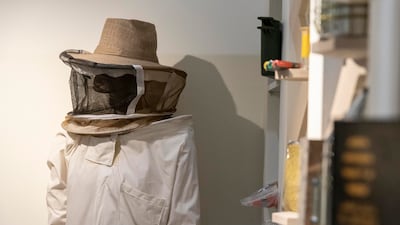From lush mangroves to rugged mountains, more travellers are looking to explore the UAE's natural beauty – but it's not just the call of the wild that is drawing in the crowds.
A report from booking.com found that 75 per cent of holidaymakers want to travel more sustainably, with the UAE in a prime position to meet a growing demand for ecotourism experiences.
Raki Phillips, chief executive of Ras Al Khaimah Tourism Development Authority, told The National that this travel trend is translating to higher visitor numbers in an emirate that is cementing its status as a nature and adventure hub.
Mr Phillips said that sustainability is a major consideration for travellers, particularly for those aged under 30.
Ras Al Khaimah recorded its best tourism figures in 2023 – the most recent statistics released – welcoming 1.22 million overnight arrivals, up eight per cent on 2022 and bolstered by a 24 per cent year-on-year surge in international visitors.
Ecotourism boom
The global ecotourism industry was estimated to be worth $248 billion in 2024, according to Precedence Research, with this number set to hit $945 billion by 2034.
"Ecotourism is so important to the community, it is driving a new type of tourist that really cares about authentic connection," said the Ras Al Khaimah tourism chief.
Mr Phillips revealed that a "significant amount" of ecofriendly development will be announced this year for Jebel Jais – the highest peak in the UAE.
Green tourism shoots for the economy
The UAE government has rolled out its "Coolest Winter" campaign, now in its fifth year, which aims to promote community engagement in agritourism by encouraging visits to farms and agricultural projects.
The theme of this year's campaign is "green tourism", which experts say could yield economic benefits.
John Burt, a professor of biology at NYU Abu Dhabi, who was awarded the Sheikh Mubarak Al Nahyan Award for natural history for his contributions to enhancing public awareness of the Emirates' marine systems, told The National that green tourism activities have the capacity to engage the public, increasing their awareness and appreciation of surrounding ecosystems.
"There are also the underappreciated conservation benefits that come from the economic value of ecotourism. Because ecosystems become sources of funds for local communities and businesses, there is an incentive to protect and conserve these habitats to ensure their long-term sustainability," he said.
Hatta at heart of vision
Examples of the agri-tourism sites under the winter campaign include the Hatta Honeybee Garden and Discovery Centre. The honey farm offers tours, beekeeper training and interactive workshops that educate tourists about the historical and ecological significance of bees and pollinators.
Sheikh Mohammed bin Rashid, Vice President and Ruler of Dubai, recently set out the emirate's ambitions to turn Hatta into a "global model for harmony between humans and nature" after reviewing progress on a Dh3.6 billion master plan for the enclave.
Sheikh Mohammed unveiled the Hatta Sustainable Waterfalls project, which is at the heart of efforts to boost tourism and draw investment to the beauty spot.

Conservation benefits of ecotourism
Beyond economic benefits, experts say that ecotourism can generate revenue for environmental projects, educating visitors, and encouraging communities to protect natural resources.
Dr Maryam Rashed Al Shehhi, assistant professor in civil and environmental engineering at Khalifa University, told The National that in the UAE eco-tourism initiatives have significantly contributed to conservation efforts. For example, Sir Bani Yas Island, home to the Arabian Wildlife Park, supports more than 13,000 animals, including the Arabian oryx, which was reintroduced through conservation-funded ecotourism.
"Similarly, Jubail Mangrove Park preserves mangrove ecosystems that protect coastlines and support biodiversity, while eco-activities like kayaking raise awareness and generate funding," said Dr Al Shehhi.
Meanwhile, Fujairah recently added four hiking trails to its growing network, with a fifth on the way, as part of a drive to boost the emirate's status as a nature tourism hub and encourage more people to enjoy the great outdoors.
The routes bring the number of approved trails in the mountainous emirate to 15 and coincide with an expected winter season boom as residents and tourists take advantage of the cooler weather.
Laila Mostafa Abdullatif, director general of Emirates Nature-WWF, highlighted that healthy and diverse coastal ecosystems were essential for sustainable tourism to thrive.
"Our assessment of natural capital in the Umm Al Quwain lagoon reveals that combining conservation and ecotourism is key to maximising ecosystem services – conservation can boost tourism and recreation benefits by up to 50 per cent, including increased footfall and visitor spending.”
The Umm Al Quwain Department of Tourism and Archaeology recently unveiled plans for its first ecotrail to open in early 2025. The initiative aims to raises awareness about the rich biodiversity and ecological value of the emirate's coastal lagoon. The ecotrail will be implemented in partnership with environmental charity Emirates Nature-WWF.
The emirate is working to harness ecotourism to generate sources of income that support the natural renewal of the marine and coastal environment, in line with the objectives of the UAQ sustainable blue economy strategy 2031. Currently, the blue economy, a term that refers to the economic activity associated with oceans, seas, and coastal regions, which is expected to contribute about 40 per cent to Umm Al Quwain's gross domestic product by 2031.











